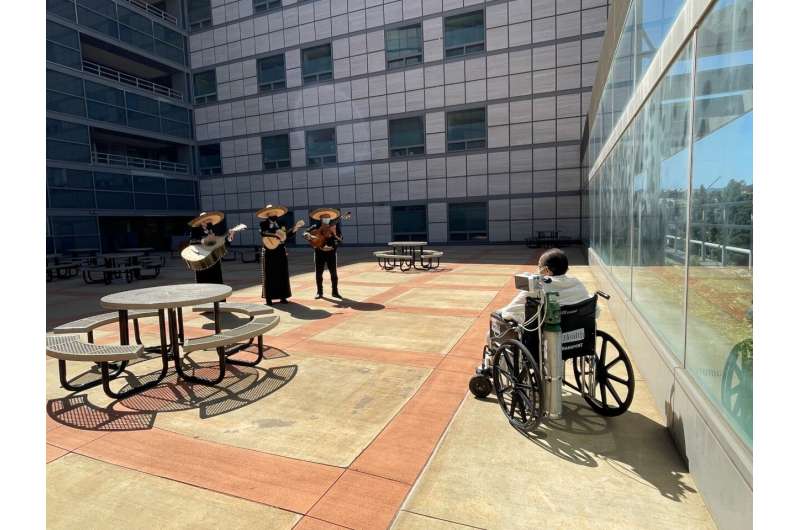Throughout the pandemic, the UCLA 3 Wishes Program has modified protocols to incorporate infection control measures, including by staging music performances outdoors. Credit: UCLA Health
A study about the initiative, published in the journal Critical Care Explorations, is the first to show empirically that a palliative care program could be adapted—and even expanded—during the pandemic. It also could serve as a case study for improving end-of-life care during an era when visiting restrictions and infection control have introduced extraordinary new challenges for health care providers.
Researchers analyzed the number and types of wishes granted, before and during the pandemic, through UCLA Health's 3 Wishes Program, which fulfills small but meaningful requests from dying patients and their families. The study followed 523 patients in six adult intensive care units at two locations, the Ronald Reagan UCLA Medical Center and the UCLA Santa Monica Medical Center.
Through the program, which was introduced in 2017, UCLA Health staff have presented patients and their families with mementos including keychains capturing the dying patient's fingerprints, framed prints of electrocardiograms and sculptures of entwined hands of loved ones. They have arranged outdoor weddings and personal music performances, and commissioned volunteers to create paintings that honor patients' interests and hobbies.
The research found that, despite the challenges of the pandemic, an average of 24.8 patients per month participated in the program during the period from March 1, 2020 through March 31, 2021, up from 17.6 patients per month during the same period a year earlier. Patients who died at the UCLA medical centers during the pandemic were less likely than those who died prior to the pandemic to have family with them and, the study found, more likely to have their postmortem wishes fulfilled for their families.
"The findings were both surprising and heartwarming," said Dr. Thanh Neville, medical director of the 3 Wishes Program and lead author of the study. "Despite the fact that patients who died in the ICU during the pandemic were less likely to have family by the bedside, the number of patients who participated in the 3 Wishes Program during the pandemic actually increased compared to before the pandemic."
That suggests that UCLA Health staff, already dedicated to their patients' well-being, took advantage of many opportunities to step up even more for patients and their families during the pandemic, Neville said.
"Having a loved one in the ICU with COVID-19 certainly put additional stress on families, but caring for these patients also took an emotional toll on ICU staff," Neville said. "Participating in 3 Wishes gave health care workers the opportunity to do something positive for these families during a tragic situation—the staff were thankful to have a way to do more than just bear witness."
Through the program, patients' requests are fulfilled not by palliative care specialists, but by frontline nurses, licensed vocational nurses and doctors in the intensive care unit.
"You might think that creating the mementos would be an unwelcome added responsibility during this busy time, but we all chose to do it, wanted to do it, offered to do it," said Kristen Hjelmhaug, an intensive care nurse at Ronald Reagan UCLA Medical Center who has been active in the 3 Wishes Program since its inception. "We would ask families, 'Would a memento be comforting to you?' and, as it turns out, all the families we asked were eager to have something that was visual and physical. These are small things, but very important emotionally."
The program's value became even more obvious during the pandemic, when spiritual care providers and social workers were only able to visit with patients online, and while hospital policies governing patients' visits with family members have been in flux. At some points during the study period, no visits at all were allowed, while at others, family members were permitted only to visit when patients were near death and then, only for an hour at a time.
To keep the program going during the pandemic, hospital staff modified the way they fulfilled patients' requests. Serenades took place outdoors to allow for physical distancing, and fingerprints used to make mementos were sterilized first with UV irradiation, for example.
The 3 Wishes Program was adapted from a similar initiative at a Canadian hospital; Neville said it could be replicated for other medical centers, adding that the need for such programs will continue to grow.
"This end-of-life program makes a difference to our patients and families," she said. "In a way, it grants the wish of providers in the ICU as well—the wish to provide the best family-centered care possible for every person, which sometimes means helping people leave this life with dignity and kindness."
More information: Thanh H. Neville et al, End-of-Life Care During the Coronavirus Disease 2019 Pandemic: The 3 Wishes Program, Critical Care Explorations (2021). DOI: 10.1097/CCE.0000000000000549
Provided by University of California, Los Angeles






















